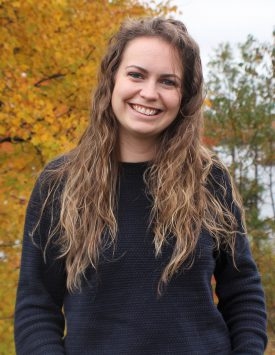Macy J. Kailing
IGC FELLOW | Global Change Center
Ph.D. Student • Biological Sciences
Research Interests: Infectious disease ecology, host-pathogen coevolution, wildlife and ecosystem health, heterogeneity in host susceptibility
Advisor: Dr. Kate Langwig
mkailing@vt.edu

Macy joined the Langwig lab in the fall of 2019. As a PhD student, she aims to gain an understanding of the fitness-related costs associated with white-nose syndrome on bats and how species’ heterogeneous responses to infection are influencing disease transmission and population impacts. Within a global change context, Macy is primarily concerned with emerging infectious diseases – disease outbreaks are difficult to predict and manage but the implications of their continued spread are far reaching. She feels that bettering our understanding of disease dynamics is vital for properly maintaining ecosystem and human health but is limited by our ability to communicate the information.
Macy earned a Bachelor of Science in Biology with an environmental concentration from Ferris State University in Big Rapids, MI in 2014. She spent several years working with the Michigan Department of Natural Resources aiding in the management of a variety of taxa, mainly waterfowl, white-tailed deer, black bears, and grassland birds during summers of her undergraduate education. Following appointments with MDNR and after graduating with her B.S., she worked with the National Ecological Observatory Network (NEON) where she was tasked in sample and data collection on a broad range of organisms including plants, invertebrates, and small mammals.
More recently, Macy held a position with USFWS in which she led efforts to survey bat presence and habitat use at a national refuge and worked with USGS-National Wildlife Health Center assisting with the nationwide surveillance efforts of white-nose syndrome (WNS). Her motivation to pursue a career in research was fostered through employment experiences where she saw first-hand the necessity for facilitating effective communication among government agencies, academics, land managers, and public policy makers.
Macy hopes that the Interfaces of Global Change program will provide her with the tools and skills required to communicate with diverse people and organizations with varying interests, the work she became passionate about throughout her employment experiences thus far. Additionally, IGC will help her to think broadly and critically about multidisciplinary fields of science, society, and economics and enable her to direct her research in ways that can provide informative guidance to strategic policy decisions.






